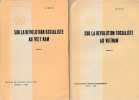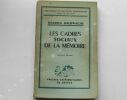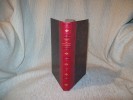-
Type
Book (3965)
Magazine (548)
Old papers (2)
Photographs (1)
Posters (8)
-
Latest
Last 24h (3)
Last 3 days (2)
Last month (29)
Last week (12)
-
Language
Dutch (1)
English (2)
French (4518)
Italian (1)
Portuguese (1)
Spanish (1)
-
Century
16th (3)
17th (2)
18th (6)
19th (102)
20th (2413)
21st (127)
-
Countries
Belgium (331)
Brazil (1)
Canada (6)
Côte d'Ivoire (1)
France (3967)
Italy (19)
Netherlands (6)
Switzerland (193)
-
Syndicate
ALAC (6)
CLAM (2)
CLAQ (1)
ILAB (1572)
NVVA (80)
SLACES (74)
SLAM (1485)
SNCAO (2)
Le peuple du Sud-Vietnam vaincra,
Editions en langues étrangères, Hanoi, 1965, 138 pp., broché, passages signalés et annotés au crayon, état correct.
Phone number : 0033 (0)1 42 23 30 39
Sur la révolution socialiste au Vietnam, 2 volumes
Editions en langues étrangères, Hanoi, 1965, 1966, 112 pp., 222 pp., broché, légères tracesd'usage, état correct.
Phone number : 0033 (0)1 42 23 30 39
GEOPOLITIQUE n° 67 (Octobre 1999)
Revue trimestrielle de l'Institut international de géopolitique : environ 100 pages, format 210 x 280 mm, illustrée, brochée couverture couleurs
Au sommaire, entre autres : Spécial Chine 1949-1999 : La Chine face à l'Occident ; La Chine populaire et les deux logiques du communisme ; Comment le parti se maintient au pouvoir ; Qui dirige la Chine ? La Chine dans le monde où le rêve d'un magister asiatique
Phone number : 04 74 33 45 19
GEOPOLITIQUE n° 80 (octobre-décembre 2002)
Revue trimestrielle de l'Institut international de géopolitique : environ 100 pages, format 210 x 280 mm, illustrée, brochée couverture couleurs
Au sommaire : Que reste-t-il du communisme ?
Phone number : 04 74 33 45 19
La FAUCILLE, le MARTEAU et le DIVAN
Un ouvrage de 381 pages, format 140 x 220 mm, broché couverture couleurs, publié en 2008, Editions du Rocher, collection "Démocratie et Totalitarisme", bon état
Etude sur le communisme
Phone number : 04 74 33 45 19
Mémoire pour la réhabilitation de Zinoviev (l'affaire Kirov)
Julliard | Paris 1962 | 11.50 x 20 cm | broché
Edition originale pour laquelle il n'a pas été tiré de grands papiers, un des exemplaires du service de presse. Envoi autographe signé de Gérard Rosenthal à Pierre Dumayet. Ouvrage illustré d'un frontispice photographique. Deux taches sur le second plat. - Photographies et détails sur www.Edition-Originale.com -


Phone number : 01 56 08 08 85
Sozialismus als "bäuerliche Utopie" ? Agrarsozialistische Konzeptionen der Narodniki und Neonarodniki im 20. Jahrhundert in Russland
Tübingen, 1994 341pp., 21cm., softcover, text in German, Doctoral dissertation (Dissertation zur Erlangung des akademischen Grades Doktor der Philosophie in der Geschichtswissenschaftlichen Fakultät der Eberhard-Karls-Universität Tübingen), stamp at verso of title page, text is clean and bright, good condition, G110719
Le Mythe errant du socialisme.
Paris Les Ides de Mars 1986 1 vol. broché in-8, broché, 225 pp. Edition originale sans grand papier avec un envoi autographe signé de l'auteur au cinéaste Alain Resnais, "cette mise en question radicale". En guise de prière d'insérer, deux photocopies de lettres tapuscrites, de l'auteur et de l'éditeur, présentant l'ouvrage. Bon exemplaire. Exemplaire provenant de la bibliothèque d'Alain Resnais.
LES CADRES SOCIAUX DE LA MÉMOIRE
Paris P;U.F.; Bibliothèque de Philosophie Contemporaine 1952 1 8° Broché 298 Presses Universitaires de France, nouvelle édition 1952. Un volume in 8° de 298 pages, quelques passages soulignés dans le texte. (L'ouvrage ayant été la propriété d'un ancien professeur de philosophie, la confrontation des idées est toujours intéressante !) Poids avant emballage 260 gr, frais d'envoi colissimo 655
Bon état général Remises possibles sur les achats en lot, achetez plusieurs objets à la fois ! Reçoit sur rendez-vous pour consultation des ouvrages.
L'ère des tyrannies. Etudes sur le socialisme et la guerre.
Paris Gallimard, coll. "Bibliothèques des idées" 1938 1 vol. broché in-8, broché, 249 pp. Préface de C. Bouglé. Couverture brunie et papier un peu jauni.
Terror in My Soul: Communist Autobiographies on Trial
Harvard University Press 2003 366 pages 16 76x3 1x24 74cm. 2003. Cartonné jaquette. 366 pages.
Très bon état avec sa jaquette intérieur propre bonne tenue notes sur la dernière garde
LE COMITE CENTRAL ET LA COMMUNE. Second Siège de Paris. Journal anecdotique.
Paris Alphonse Lemerre 1871. In-12 2 feuillets non chiffrés 2-258pp 1 feuillet non chiffré. Demi chagrin rouge, dos à nerfs orné de petites pastilles finement dorées, reliure de l'époque. Bel exemplaire frais, bien complet de son texte dans une reliure de qualité décorative et en très bon état.
La Quillec 1178. Anecdotes anti-communardes.
Rescapé du camp 14. De l'enfer nord Coréen à la liberté
Belfond Belfond, 2012. In-8 broché de 279 pages. Parfait état.
Toutes les expéditions sont faites en suivi au-dessus de 25 euros. Expédition quotidienne pour les envois simples, suivis, recommandés ou Colissimo.
Voyage à l'intérieur du Parti Communiste.
1974 P., Seuil, 1974, in 8, broché, 444pp.
...................... Photos sur demande ..........................


Phone number : 04 77 32 63 69
Voyage à l'intérieur du Parti communiste
Seuil Seuil, 1974. Grand In-8 broché de 440 pages. Bon état.
Toutes les expéditions sont faites en suivi au-dessus de 25 euros. Expédition quotidienne pour les envois simples, suivis, recommandés ou Colissimo.
Russland : Was lehrt uns das heutige Russland?. Reihe: ‘Silvaniadruck’, 43.
Neuenkirch, Kt. Luzern : Werkgemeinschaft Silvania, (zubeziehen durch Gebr. Hess, Basel), 1936, in-8°, IV + 18 n.n. S., (letzte 3 S. mit Werbung, u.a.: Heilmittel - Hustensirop und... Universität Freiburg in der Schweiz, Theol. - Jur.- Philos. Fak., (&) mit seine Bibliothek mit 450.000 Bänden), (loose Beiliegend: 2 Werbungszettel für Kleiderfabrik Frey (auf Rosapapier), & Werkgemeinschaft Silvania (auf Gelbespapier), Original-Broschüre mit rotem illustr. Umschlag. (Sign. JAEL) / Verso mit Werbung für das Bündnerschaf, Bergbauern Hilfe..., Tuchfabrik Truns.
Flugblatt von Promotoren des antibolschewistischen (christlichen) Kampfs gegen die russische Bedrohung. ‘Kampf dem Bolschewismus !’ Image disp.

(SLACES, NVVA)
Phone number : 41 (0)26 3223808
Roots of Revolution: A History of the Populist and Socialist Movements in 19th Century Russia: A History of the Populist and Socialist Movements in the Nineteenth-century Russia
Weidenfeld & Nicolson History 2025 850 pages in8. 2025. Broché. 850 pages.
Bon état; tranche salie dos creusé intérieur propre
L'Historien et le mouvement social.
Collection Bibliothèque SocialisteParis, Maspero, 1980 in-8, 341 pp., broché. Couverture jaunie.
- - VENTE PAR CORRESPONDANCE UNIQUEMENT - LIEN DE PAIEMENT, NOUS CONSULTER.
Socialisme et charité : études sociales.
Paris Calmann-Lévy 1895 1 vol. relié in-8, demi-chagrin vert, dos à nerfs, caissons encadrés d'un double filet doré, (4) + XII + 500 pp. Edition originale. Dos passé, sinon bon exemplaire, agréablement relié au début du XXe siècle.
Le cauchemar du monde post-communiste
Anatolia, 1994, 55 pp., broché, couverture partiellement décolorée, bon état.
Phone number : 0033 (0)1 42 23 30 39
HAVEL, Vaclav - textes réunis par Roger Errera et Jan Vladislav - Préface de Jan Vladislav
Reference : 111534
(1989)
Essais politiques
1989 Editions Calmann-Lévy, collection "Liberté de l'esprit" - 1989 - In-8, broché - 255 p.
Bon état - Coins très légèrement émoussés
 Write to the booksellers
Write to the booksellers















